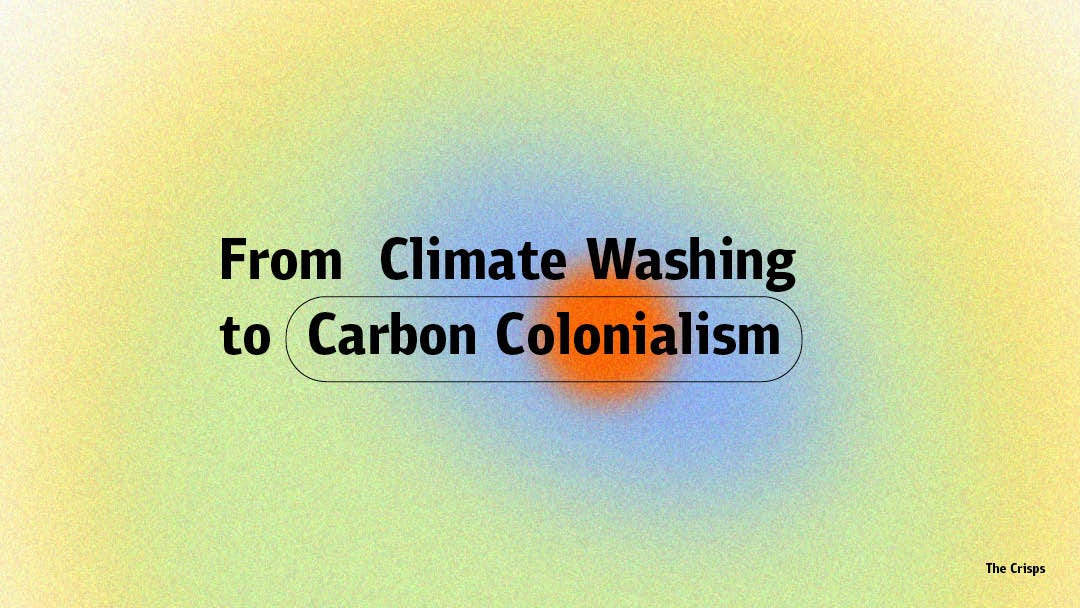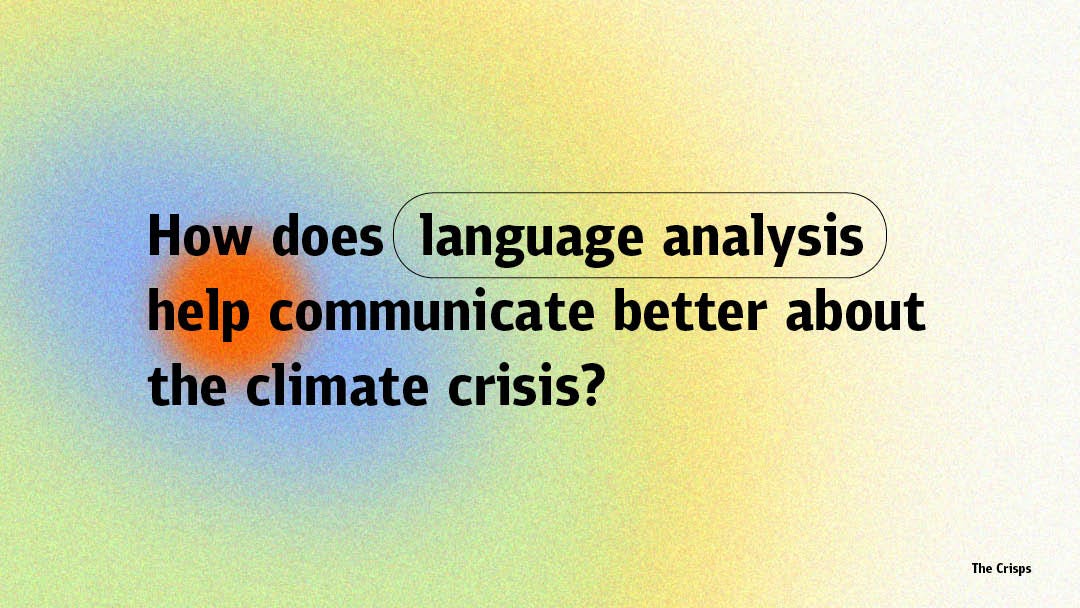Climate Talks: The Illusion of Change
Exposing Climate Washing, Climate Hushing, Climate Justice and more
Welcome to another issue of The Crisps, your snackable anti-greenwashing newsletter for the fashion industry. If you haven’t subscribed already, make sure to receive future issues of The Crisps directly to your inbox.
Just two weeks ago the UN Environment Programme (UNEP) and the United Nations Framework Convention on Climate Change released "The Sustainable Fashion Communication Playbook - A guide to aligning fashion communication to the 1.5 ℃ climate target and wider sustainability goals"1. Our exploration of this playbook left us a bit disappointed – to say the least. Especially with regard to how the fashion climate scenario is interpreted, we see the potential for improvement. While it emphasizes changing lifestyles with a focus on overconsumption, the reality is that we need a holistic cultural shift to address the climate crises effectively – and we all know that.
So we thought, it would be a great opportunity to dive into the world of talking about climate and its terminology. Because is all the talking about sustainability in terms of climate truly driving meaningful action? Or is it rather fueling inaction and greenwashing? This issue is supposed to be a gentle reminder that every word matters when it comes to climate communication. To effectively promote positive climate actions, it is crucial to engage in extensive testing of climate action language, ensuring it resonates with target audiences and comprehending how even slight adjustments in terminology can profoundly impact people's responses to the climate crisis messaging.
Let's uncover these interconnections through short research that hopefully serves as a vital resource for climate communicators and responsible businesses operating within the fashion industry. So feel free to share it with them!
Get into the details with us and learn more about the terms climate washing, climate hushing, carbon tunnel vision, climate justice, and carbon colonialism.
Climate Washing: Misleading Claims and Lawsuits
Greenwashing specifically related to the climate crisis is also referred to as "climate washing". It can include the use of false claims, concealment of important information that could help evaluate the meaning or context of a claim related to climate components, and/or the use of vague or ambiguous terms.2 The rise of climate washing is alarming. Companies and even governments face legal challenges over misinformation and misleading green claims regarding their efforts to combat climate change. According to Reuters, 26 climate-washing cases were filed globally in 2022, reflecting a sharp increase from previous years. The truthfulness of corporate climate commitments is being questioned, especially when unsupported by adequate plans and policies.3
Climate Hushing: The Silent Retreat
A growing trend known as greenhushing has emerged with companies choosing to remain silent about their emissions reduction goals. The fear of backlash and scrutiny has led some businesses to go radio silent – avoiding publicizing their science-based emissions targets. While there may be practical reasons for this approach, such as managing expectations and avoiding scrutiny, it raises concerns about transparency and hindering climate ambition.4
Carbon Tunnel Vision: Looking Beyond Emissions
It is crucial to recognize that climate action goes beyond carbon and other greenhouse has emissions alone. Fixating solely on emissions ignores a range of interconnected issues such as ecotoxicity, biodiversity loss, poverty, water crises, and more. By breaking free from the constraints of carbon-centric thinking, we can embrace a broader perspective and take a holistic approach to sustainability in the fashion industry.5
Climate Justice: A Call for Intersectionality
To address climate crises, we must incorporate climate justice into the conversation. The fashion industry needs to recognize the intersection of climate terminology with historical injustices, colonialism, racism, and classism. This perspective calls for imaginative and impactful actions that reject business as usual and demand systemic change rather than solely relying on offsetting wrongly calculated greenhouse gas emissions.
Carbon Colonialism: The Global North's Dirty Secret
This week we stumbled upon a great article from Atmos and a new term (for us) and we believe we need to share it with you: “carbon colonialism” thrives as the Global North shamelessly outsources its carbon emissions, shifting dirty industries and waste to the Global South. It's time to expose these injustices and demand that the Global North takes responsibility for its economy and production. From garbage dumps, we witness the plight of individuals, tirelessly sifting through the waste of the global garment industry, while Western brands claim innocence. Carbon colonialism conceals the true environmental impacts, legitimizing extraction under the guise of sustainability. This practice perpetuates a centuries-old mindset of exploiting distant lands, leaving waste behind. We must “decolonize” climate change by reshaping our response to include global interconnectedness and holding supply chains accountable. Rejecting carbon or climate colonialism means lifting the veil of ignorance and demanding an end to abuses. It's time to reclaim responsibility for our economy, production, and climate. A negative example is the recent statement of H&Ms CEO Helena Helmersson denying clothing dumped on African sites. She blatantly lies.6
As we strive for a better fashion industry, we must be wary of empty climate talks, misleading claims, and a narrow focus on greenhouse gas emissions. By exposing greenwashing, broadening the conversation, and embracing climate justice, we can break free from the limitations that hinder progress and pave the way for genuine change. It is recommended for fashion brands to embrace this climate justice perspective that acknowledges historical injustices and tackles systemic issues of inequality and discrimination alongside environmental concerns. Here are five terms we’d rather use and why7:
1. "Climate Emergency" and "Climate Crisis" over "Climate Change"
Enough with the term "climate change" that fails to capture the gravity of the situation. Let's ignite the flames of urgency by embracing the bold labels of "climate emergency" and "climate crisis" to convey the broader impact of this looming catastrophe. And when the scientific or geophysical sense demands specificity, don't shy away from terms like "climate breakdown" or "global heating," because let's face it, climate breakdown is fueling the ferocity of hurricanes and other extreme weather events.
2. "Climate Skeptic" over "Climate Science Denier"
It's time to expose those who blatantly deny the overwhelming scientific evidence and bury their heads in the sand. These individuals deny that climate change is happening or caused by human activity, making the term "climate denier" more accurate and fitting for their deliberate ignorance than the term “climate skeptic” ever will.
3. "Global Heating"
Forget about the cozy-sounding "global warming." Instead, let’s start using"global heating." The Earth's greenhouse gases create a suffocating atmospheric blanket that traps the sun's scorching heat, leading to intensified temperature rise and catastrophic consequences. So it’s definitely more accurate, don’t you think?
4. "Greenhouse Gas Emissions"
Don't limit your narrative to just "carbon emissions" or "carbon dioxide emissions." These terms fail to capture the whole picture. We must confront the reality that various gases contribute to the warming of our atmosphere. By using "greenhouse gas emissions," we recognize the full spectrum of climate-damaging culprits, including methane, nitrogen oxides, CFCs, and more. Let's expose them all.
5. "Climate Colonialism" over "Climate Outsourcing"
No more sugarcoating the exploitation. It's time to reveal the ugly truth of "climate colonialism." The Global North shamelessly outsources its climate-affecting greenhouse gas emissions by moving dirty industries and waste to the Global South. This oppressive system perpetuates the same power dynamics that governed imperial production. It's time to unmask the injustice and demand an end to "climate colonialism".
In our next pro version, we are diving into the details of further climate terminology, dismantling terms like “carbon neutral”, and “net zero” and explaining why there is a huge knowing-doing gap when communication tries to tackle the 1.5-degree target.
All the best,
Tanita & Lavinia
Want to read to more, here is what we recommend:
Climate Dictionary by the UNDP: https://climatepromise.undp.org/news-and-stories/climate-dictionary-everyday-guide-climate-change
How to move beyond the carbon tunnel vision by Jan Konietzko: https://digitally.cognizant.com/moving-beyond-carbon-tunnel-vision-with-a-sustainability-data-strategy-codex7121
The disrupting article from Atmos on “carbon colonialism”: https://atmos.earth/where-global-north-sends-its-carbon-emissions/
An eye-opening article by B. Lorraine Smith on “net zero” scenarios:
Diverse (2023). United Nations Environment Program. Sustainable Fashion Communication Playbook. https://www.unep.org/interactives/sustainable-fashion-communication-playbook/ (accessed online 30.06.2023)
Bhargava, A., Martínez Toral, K. and Tandon, A. (2022). Climate-Washing: Legal Liability for the New Green-Washing?. https://energytransition.org/2022/06/climate-washing-legal-liability-for-the-new-green-washing (accessed online 06.07.2023)
Reggiori Wilkes, T., Editing by Aurora Ellis, A. (2023). 'Climate washing' lawsuits jump as more activists challenge corporate claims, report shows. https://www.reuters.com/sustainability/climate-washing-lawsuits-jump-more-activists-challenge-corporate-claims-report-2023-06-28/#:~:text=The%20report%2C%20compiled%20by%20London's,misinformation%20or%20misleading%20green%20claims (accessed online 30.06.2023)
Khan, D. (2022). ‘Green-hushing’ is the new greenwashing. https://www.politico.com/newsletters/the-long-game/2022/10/18/green-hushing-is-the-new-greenwashing-00062275 (accessed online 02.07.2023)
Konietzko, J. (2022). Moving beyond carbon tunnel vision with a sustainability data strategy. https://digitally.cognizant.com/moving-beyond-carbon-tunnel-vision-with-a-sustainability-data-strategy-codex7121 (accessed online 02.07.2023)
Parsons, L. (2023). Lifting the Curtain on Carbon Colonialism. https://atmos.earth/where-global-north-sends-its-carbon-emissions/ (accessed online 05.07.2023)
Unknown author (2019). 'It's a crisis, not a change': the six Guardian language changes on climate matters. https://www.theguardian.com/environment/2019/oct/16/guardian-language-changes-climate-environment (accessed online 05.07.2023)




